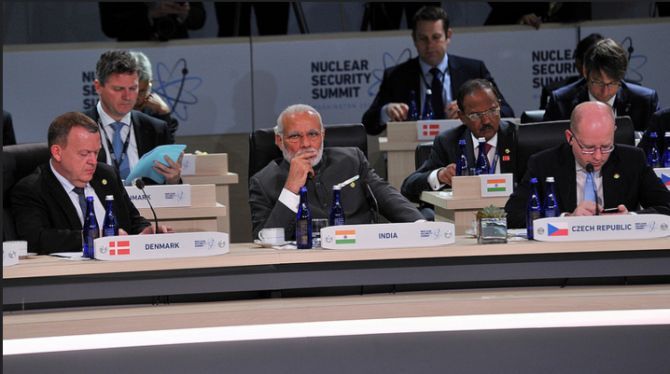 | « Back to article | Print this article |

'Pakistan has been successful in convincing the rest of the world that the Pakistani nuclear terrorists are meant to target only India. This is myopia at its worst,' says Colonel Anil A Athale (retd).
The Nuclear Security Summit in Washington, DC was like a performance of Hamlet without the Prince of Denmark. The absence of Russia, North Korea and the prime minister of Pakistan made it a gathering of 'like-minded' do-gooders without any progress on the issue of the terrorist nuclear threat, the ostensible agenda of the meeting.
Russia is a country of concern due to the fact that since the demise of the Soviet Union a large number of nuclear weapons of Russian origin are unaccounted for, the so-called 'loose nukes.' North Korea has not only acquired nuclear weapons, but is also a country in a desperate economic situation whereby 'selling' nukes to a terrorist organisation is a real possibility.
In the case of Pakistan, with the fastest growing nuclear arsenal, that country has plans to deploy small and tactical nuclear weapons. This makes the likelihood of these falling into the hands of numerous terrorist groups based there, either through theft or through a sympathetic military commander, a real possibility.
India, as the likely target of a Pakistan origin nuclear terror threat, had a vital interest in the outcome of this meeting.
However, the increasing global reach and ambition of the Pakistan-based terrorist groups leaves other countries as vulnerable. The outcome of the Nuclear Security Summit belies this reality and seems Pakistan has been successful in convincing the rest of the world that the Pakistani nuclear terrorists are meant to target only India. This is myopia at its worst.
Graham T Allison, a Harvard University professor writing in October 2004, had claimed that Pakistan is a nuclear time bomb and posed the greatest threat to the security of the United States.
The context then was Pakistani hobnobbing with Al Qaeda. In August 2001, even as the final planning for 9/11 was under way, Osama bin Laden met two former officials of Pakistan's atomic energy programme -- Sultan Bashiruddin Mahmood and Abdul Majid -- near Kabul.
Over the course of three days of intense conversation bin Laden and his second-in-command, Ayman al-Zawahiri, grilled Mahmood and Majid about how to make weapons of mass destruction.
After the neutralisation of bin Laden on May 2, 2011 from a compound near a Pakistani military establishment in Abbotabad, Al Qaeda has been weakened beyond repair. However, Islamic State or Daesh, a more virulent mutation of Al Qaeda, has taken its place.
Pakistan claims that it is opposed to IS. But given the past history of its dealing with Al Qaeda and sheltering bin Laden in Abbotabad, this Pakistani assertion needs to be taken with a pinch of salt.
President Barack Obama's post conference comments equated India and Pakistan and cautioned the two countries against their increasing nuclear arsenals. Critics have pointed out that the summits have only focused on highly enriched uranium in civilian possession, which only accounts for 2 to 3 percent of the world's supply. That small percentage is used mostly by academics for research and medical isotope production.
The remaining 97 to 98 percent is held in military stockpiles, which the security summits have largely ignored. Countries keep the safeguards on these stockpiles secret, and military material falls outside the scope of international security agreements.
The 2014 summit acknowledged that military stockpiles receive far less attention and explained: 'Nuclear materials in weapons are not excluded from the (Nuclear Security Summit) discussions as such, but the emphasis is on nuclear materials in industry. Military stocks are a sensitive issue, and discussing them could be an obstacle to achieving results in dealing with civil nuclear materials.'
The world has been grappling with the knotty issue of fissile material production control for several years now. The consensus on this vital issue has eluded the Geneva conference.
Till such time as the countries of the world do not accept controls over production of fissile material, mainly for military purposes, the danger of these falling into the hands of terrorists is ever present.
The conference totally ignored the new danger that the Pakistani decision to make small nuclear weapons posed to world peace. These are meant to use against Indian conventional retaliation to Pakistan-sponsored terror attacks.
The simplest solution for this dilemma is for Pakistan to give up its support to terrorism. But it seems that Pakistan is still unwilling to cross that bridge yet.
I have for long proposed a way out of this problem by making 'accounting' for every gram of fissile material compulsory. The idea is that every country must at all times account for the fissile material, both for civil and military purpose, at all times.
If any diversion takes place, the world should hold the country responsible and a mandatory regime of UN sanctions must kick in. This is the second best alternative to fissile material production control.
The one important takeaway for India, that is concerned at the Pakistani plans to deploy tactical nuclear weapons, is that we have to take care of this problem ourselves and should not expect any global help.